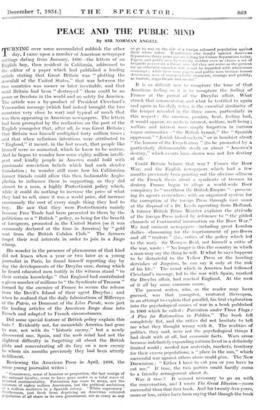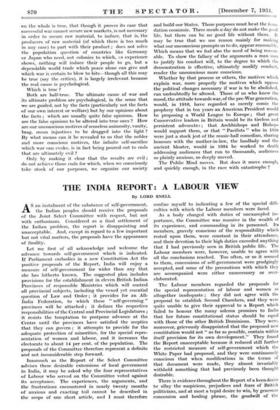PEACE AND THE PUBLIC MIND
By SIR NORMAN ANGELL TURNING over some accumulated rubbish the other day, I came upon a number of American newspaper cuttings dating from January, 1896—the letters of an English boy, then resident in California, addressed to the editor of a paper which had published a leading article stating that Great Britain was " plotting the downfall of the United States," that war between the two countries was sooner or later inevitable, and that until Britain had been " destroyed " there could be no peace or freedom in the world and no safety for America. The article was a by-product of President Cleveland's Venezuelan message (which had indeed brought the two countries very close to war) and typical of much that was then appearing in American newspapers. The letters had been prompted by the realization on the part of the English youngster that, after all, he was Great Britain ; that Britain was himself multiplied forty million times ; and that when nefarious intentions were attributed to " England," it meant, in the last resort, that people like himself were so animated, which he knew to be untrue.
And he began to wonder how some eighty million intelli- gent and kindly people in America could hold with passionate conviction beliefs which had such slender foundation ; to wonder still more how his Californian farmer friends could allow this then fashionable Anglo- phobia to influence them in supporting, as they did almost to a man, a highly Protectionist policy which, while it could do nothing to increase the price of what they had to sell, since it was a world price, did increase enormously the cost of every single thing they had to buy. He saw that they were Protectionists mainly because Free Trade had been presented to them by the politicians as a " British " policy, as being for the benefit of foreigners, promoted in the United States (so it was commonly declared at the time in America) by " gold sent from the British Cobden Club." The farmers forgot their real interests in order to join in a Jingo whoop.
His wonder in the presence of phenomena of that kind did not lessen when a year or two later as a young journalist in Paris, lie found himself reporting day by day the developments of the Dreyfus case, during which he heard educated men testify in the witness stand " to their certain. knowledge " that England had contributed a given number of millions to " the Syndicate of Treason " formed by the enemies of France to secure the release from the Devil's Island of their agent Dreyfus ; and when he realized that the daily fulminations of Millevoye of the Paine, or Drumont of the Libre Parole, were just the leading articles of the American Jingo done into French and adapted to French circumstances.
Did some special feature of British policy explain this hate ? Evidently not, for meanwhile America had gone to war, not with its " historic enemy," but a newly discovered one, Spain, and the mob mind .had not the slightest difficulty in forgetting all about the British plots and concentrating all its fury on a new enemy to whom six months previously they had been utterly indifferent.
Reviewing the American Press in April, 1898, the same young journalist writes : " Consistency, sense of humour or proportion, the last vestige of the rational faculty, seem to have gone under in a tidal wave of inverted sentimentality. Patriotism has come to mean, not the interests of eighty million Americans, but the political ambitions of a million mulattos in a Spanish colony. White supremacy ' Southerners, just fresh from depriving an American coloured Population of all share in its own government, are as crazy as any to go to war on the side of a foreign coloured population against their white rulers. Republicans who fought against American Separatism thirty years aLm am yelling for Cuban Separatism today. Papers and public men livNteri,;d1v slobber over as choice a set of brigands as ever slit a throat, who, did they not serve as the pretext for an otherwise causeless war, would be regarded with wholesome contempt ; while these same papers and public men beslimo honest Americans, men of unimpeachable character, courage and probity, as traitors, copperheads and sneaks."
It is as difficult now to recapture the tone of that American feeling as it is to recapture the feeling of France at the period of the Dreyfus affair. What struck that commentator, and what he testified to again and again in his daily notes, is the essential similarity of the temper revealed in the three cases, particularly in this respect : the emotion, passion, heat, feeling had, it would appear, no roots in interest, welfare, well-being ; welfare and interest were simply forgotten in curious vague animosities—" the British tyrant," the " Spanish oppressor," "Jewish blood-suckers," or in bombast about " the honour of the French army " (to be promoted by a particularly dishonourable deed) or about " America's destiny," which events have shown was not her destiny at all.
Could Britain behave that way ? Comes the Boer War, and the English newspapers which had a few months previously been pointing out the obvious silliness of the French thesis about a syndicate of treason to destroy France began to allege a world-wide Boer conspiracy to " overthrow the British Empire "—possess- ing its agents everywhere, with an organized system for the corruption of the foreign Press through vast sums at the disposal of a Dr. Leyds operating from Holland. A former British Prime Minister explains the attitude of the foreign Press indeed by reference to " the gilded channels of Continental information on the Boer War." We find eminent newspapers—including great London dailies—clamouring for the imprisonment of pro-Boers and all " traitors " (i.e., critics of the policy which led to the war). Sir Wemyss Reid, not himself a critic of the war, wrote : " No longer is this the country in which a man may say the thing he will. If what he says happens to be distasteful to the Yellow Press or the howling dervishes of Jingoism, he can say it only at the risk of his life." The mood which in America had followed Cleveland's message, led to the war with Spain, marked the Dreyfus affair, had reached England. At the root of it all lay some common cause.
The present writer, who, as the reader may have guessed, was that youngster, ventured thereupon, iri an attempt to explain that parallel, his first exploration into the psychological causes of war in a book published in 1903 which he called : Patriotism under Three Flags : A Plea for Rationalism in Polities." The book fell completely flat, and the critics did not hesitate to tell me what they thought wrong with it. The realities of politics, they said, were not the psychological things I had dealt with at all, but economic facts. Wars arose because indefinitely expanding nations lived in a definitely limited world ; needed raw materials, markets, territory for their excess populations, a " place in the sun," which successful war against others alone could give. The New Darwinism : " Either I have to eat you or you have to eat me." If true, the two parties could hardly come to a friendly arrangement about it.
Was it true ? It seemed necessary to go on with the conversation, and I wrote The Great Illusion—more successful than that first book. And for twenty-five years, more or less, critics have been saying that though the book on the whole is true, that though it proves its case that successful war cannot secure new markets, is not necessary in order to secure raw material, to induce, that is, the producers of raw material (of which there is too much in any case) to part with their product ; does not solve the population question of countries like Germany or Japan who need, not colonies to which, t-s experience shows, nothing will induce their people to go, but a dependable world trade which peace alone can give and which war is certain to blow to bits—though all this may be true (say the critics), it is largely irrelevant because the real cause is psychological.
Which is true ?
Both are half-true. The ultimate cause of war and its ultimate problem are psychological, in the sense that we are guided, not by the facts (particularly not the facts of our own interest or welfare) but by our opinions about the facts ; which are usually quite false opinions. How are the false opinions to be altered into true ones ? How are our unconscious motives of senseless animosity, vanity, brag, mean injustices to be dragged into the light ? By what means can it be revealed to us that the nobler and more conscious motives, the infinite self-sacrifice which war can evoke, is in fact being poured out to ends that are ultimately evil ?
Only by making it clear that the results are evil ; do not achieve those ends for which, when we consciously take stock of our purposes, we organize our society and build our States. Those purposes must be at the foun. dation economic. Three meals a: day do not make the good life, but there can be no good life without them. It may be true that we use reason mainly for making what our unconscious prompts us to do, appear.reasonable. Which means that we feel also the need of being reason- able. To show the fallacy of the arguments a man uses to justify his conduct will, to the degree to which the demonstration is effective, ultimately modify conduct, render the unconscious more conscious.
Whether by that process or others, the motives which explain war, more properly the motives which oppose the political changes necessary if war is to be abolished, can undoubtedly be altered. Those of us who knew the mood, the attitude towards war, of the pre-War generation, would, in 1910, have regarded as merely comic the prophesy that in ten years an American President would be proposing a World League to Europe ; that great Conservative leaders in Britain would be its tireless and persistent advocate3 ; that Archbishops and Bishops would support them, or that " Pacifists " who in 1910 were just a stock jest of the music-hall comedian, sharing honours with the mother-in-law, the landlady and the ancient bloater, would in 1934 be worked to death addressing audiences that run to thousands, audiences so plainly anxious, so deeply moved.
The Public Mind moves. But does it move enough, and quickly enough, in the race with catastrophe ?



















































 Previous page
Previous page